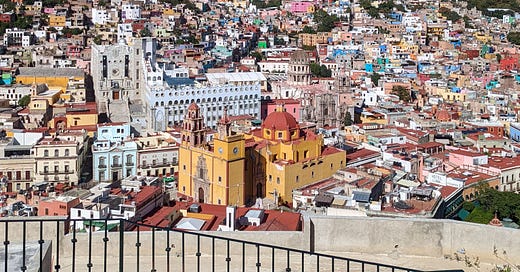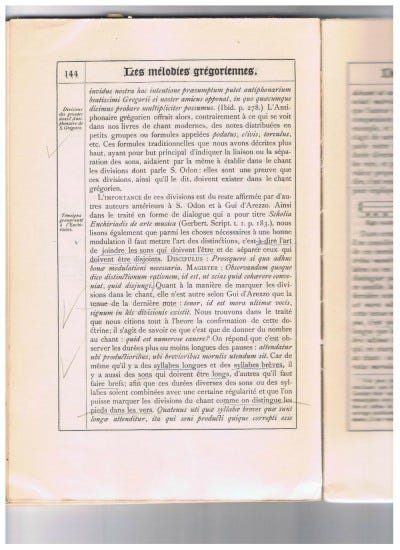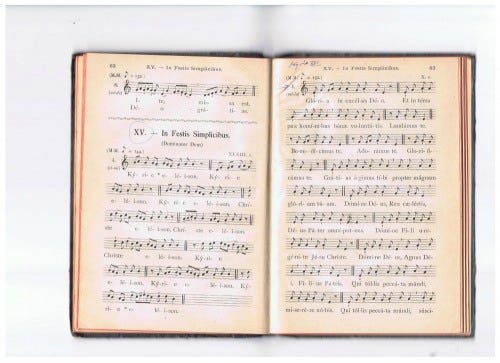Participation, amiright?
Greetings! I had said that November 4 would be the first *real* post of this Substack, and that hasn’t changed. That will be the first post inviting comments. But I wanted to check in - now that we’ve reached 200 subscribers! - from lovely Guanajuato, Mexico, where I am until next week.
What I thought I’d do today is share an old post from my regular blog. You can go read it there - or just stay here. I hope it sets a tone for what I’m trying to accomplish here.
I ran across the following in my parents’ stash. Two books. Music books.
They belonged to Eva Langlois Desjardins, my great-aunt, who raised my mother. She and her husband, Louis Desjardins, a dentist, had no children of their own, but took in my mother, her brother, and their mother – Eva’s sister – Marie Langlois Bergeron, after my mother’s father, Joseph, died in a car accident when my mother was six years old in 1931 or so. Not too long after that, my grandmother had a nervous breakdown – I eventually learned she had attempted suicide – and moved to a rest home in Lewiston, where she lived for the next forty years or so. So my mother always thought of Eva and Louis in parental terms. Anyway.
The lived in a small town in southern Maine.
Eva was one of the parish organists. Louis played the violin and sang baritone.
Eva, like all of the generation of that family preceding my mother, was born in Quebec of a middle class family. She was educated through high school – a convent school, I believe. Not boarding, but run by a religious order of some sort. So, that’s what she had, along with music lessons, I presume: a high school education.
She was the organist, as I said, in the parish in that small town. The music books I found are filled with notes for both her, the organist, and her husband, a singer and violinist. This was a Francophone parish, where my mother attended the parish school. The same parish which we attended, decades later, on Sundays during our annual month-long visits.
Of course by the time I got there, and was sentient – the late 60’s and 70’s – things had changed.
I actually remember those Masses pretty vividly. They made a big impact on me, and the impact was all about the music. I’ve never forgotten that music accompanying those Masses in the mid-70’s. It was:
A tape recording of Glory and Praise songs piped through the loudspeakers.
And not a soul singing along.
I’ve talked to a lot of people who lived through and had awareness of the changes brought by the Council. Some were heartbroken – I remember in particular one man who had converted right before Vatican II and expressed feeling as if he had been lied to and betrayed when the changes hit. Others were elated and welcomed the changes that came. Another older friend has expressed to me his experience of finding the religious experiences of his pre-Vatican II childhood and young adulthood dry and lifeless, and the vernacular liturgy and other changes, including for him, involvement in the Catholic charismatic movement, bringing a good kind of transformation – a deep connection to Christ and the Church, which he had not felt before. Life-saving, as he put it.
This post isn’t about rehashing all of that.
It’s just about these artifacts and memories. About a woman with a high school education and her well-worn and marked-up book of chant technique in Latin and French. It’s about a bit of an exercise in imaginative memory, as I wonder what Eva and Louis thought about as they sat there in the pews of their parish after the changes – for they did, indeed live through them – having been informed that for the sake of full and active participation of the faithful, their services were no longer needed, contemplating and remembering as the strains of a tinny recording of Sing to the Mountains wafted through a silent church.









